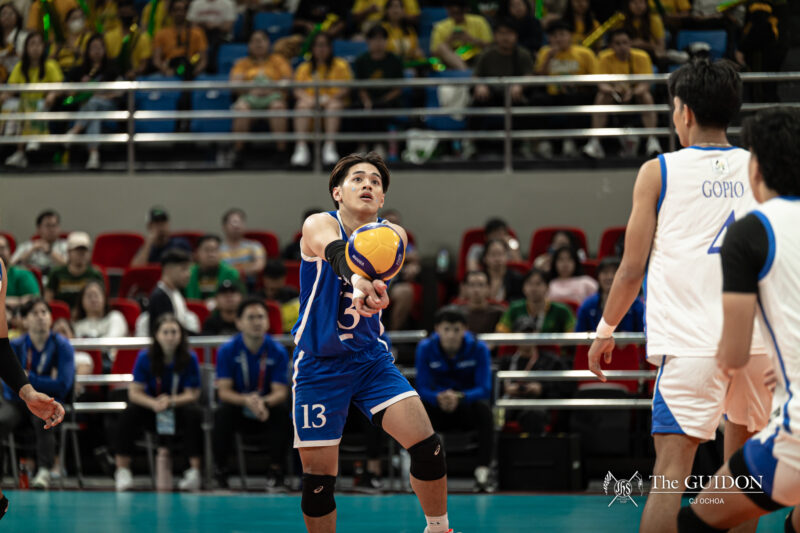THE ATENEO Assembly called the youth to speak up and contribute to the betterment of the nation through one of its flagship projects, the Philippine Model Congress: Ateneo (PMCA) held at Escaler Hall on November 22 to 23.
The PMCA is a two-day conference that allowed aspiring youth leaders to learn more about national issues the country is currently facing and to discuss what needs to be done to address these problems through a simulated congressional setting.
PMCA Project Head Madeleine Ong said that the conference seeks to encourage the youth to be involved in the country’s pursuit for inclusive development.
The PMCA is patterned after the Philippine Model Congress (PMC), an annual yearly conference that selects high school and college students from all over the country to simulate congressional debates, engage in workshops and learn from guest speakers at the Philippine Senate building.
“The PMCA, as the Ateneo chapter of the annual PMC, ultimately tries to enlighten the future leaders of the nation about the sociopolitical issues of today,” Ong said.
The Ateneo Assembly President Pauline Carillo aired similar sentiments, saying that the youth has a role to play in “demanding institutional reform and deepening democracy.”
Furthermore, Carillo stressed that the youth of today often avoid or dissociate themselves from politics due to the various controversies, injustices and issues of corruption it entails.
In light of this, she added that the PMCA tries to help the youth to be immersed in the work of youth leadership and good governance.
The speakers for the two-day event included the following: Senate Committee on Youth Chairman Senator Paolo “Bam” Aquino IV, social entrepreneur from the Pinoy Doctors Medical Center Dr. Michael Santos, Asian Institute of Management Policy Center Executive Director Dr. Ronald Mendoza, Bangko Sentral ng Pilipinas Assistant Governor Almasara Tuano-Amador, Joey Velasco Foundation President Queeny Velasco, University of the Philippines-Diliman Political Science Professor Clarita Carlos, PhD, Akbayan Partylist Spokesperson Risa Hontiveros, Akbayan Representative Honorable Walden Bello and Ateneo School of Government Dean Tony La Viña.
The Ateneo Assembly is an accredited student political organization of the Ateneo.
Legislation
The PMCA featured simulations of actual law legislation procedures through a unified plenary, which was the main gathering of all the delegates in the conference.
Prior to the event, the delegates were sorted into committees that suited their skills and interests. The list of committees included the following sectors: Business, economics and entrepreneurship, education and culture, labor and agrarian reform, health and science, technology and environment.
During the committee sessions, delegates met with their respective groups to debate over and decide upon a bill proposal that would be subject to the plenary’s approval.
Bills that passed the plenary level included “An Act Enhancing the Mother Tongue-Based Multilingual Education of the K-12 Program by Teaching Regional Literature in Grade 7 through Mother Tongue Languages” and “Ammendments to Republic Act 7875: An Act Instituting a National Health Insurance Program for All Filipinos,” which were proposed by management engineering junior Marc Duque and health sciences senior Francesca de Jesus, respectively
The said bills will be forwarded to the House of Representatives for further deliberation and for possible enactment and legislation into new laws.
Call to action
During the national situationer forums, the conference speakers encouraged the delegates to involve themselves in various problems that continue to confront the nation and the world at large.
The said forums were a two-part segment of the conference where guest speakers talk about and raise awareness over a specific national issue or concern.
In his speech, Aquino stressed the importance of the participation of the youth, particularly in the discourse of public issues. “The role of young people is to really make sure that as our country grows, there is really space for everyone else.”
“There is a need to mainstream the youth, as opposed to [them] being the outliers,” he added in a mix of English and Filipino.
Hontiveros, on the other hand, called for support to the marginalized sectors who continue to suffer discrimination and other social injustices at present.
She expressed support for the Kilusan para sa Ugnayan ng mga Samahang Magniniyog (KILUS Magniniyog), an alliance of coconut farmers rallying for the proper procurement of the coconut levy funds which will aid in the development of the coconut farming industry.
“Sana maging mabunga ang pagharap ng mga magniniyog at ni [President Benigno “Noynoy” Aquino III] (Hopefully, the negotiations between the farmers and President Benigno “Noynoy” Aquino III will be fruitful),” she said.
On November 26, the KILUS Magniniyog farmers engaged in a dialogue with Aquino at the Malacañang Palace.
Aquino agreed to declare the enactment of the coco levy bill in Congress as urgent, to protect the P71-billion levy funds; he also agreed to issue an executive order that will mandate a yearly procurement of P3 B to the farmers while legislation of the said bill is still underway.
During his speech, La Viña raised issues concerning public health and the environment and called for a realignment of goals.
“Our environmental state now has been the result of accumulated decisions for the past 20 years,” he said.
Ong said that the forums were intended to inform the delegates of the marginalized sectors of society so they may instill the value of nation-building as leaders.
For business administration and legal management junio Marizeta Auro from Ateneo de Naga University, the conference helped her develop a firm resolve to “make the Philippines better.”
“My knowledge of the situation of my country leads me to anything I could do to be a good citizen of it and eventually, of today’s world,” she added.
Chemical engineering senior Joeces Cual from Xavier University-Ateneo de Cagayan said that taking part in the conference was an enlightening experience, as it helped him assess and see for himself which mandates need to be prioritized for the benefit of his “marginalized countrymen.”
On the other hand, economics and development studies junior Paolo Magnata stressed that the conference made him experience what it feels like to draft laws and fight for them.
“We were pressured. We were angered. Nonetheless, we were motivated,” said Magnata.
Selection
The PMCA invited aspiring delegates coming from Jesuit institutions all over the country.
Carillo said that the PMCA screening committee had to limit the selection of delegates in order to adhere to the rules and technicalities set by the original PMC franchise, which requires the establishing of a “distinct community.”
Moreover, Carillo said that she wanted the conference to serve as a way to unite the collective voice of the Atenean.
“When Ateneans incite discourse, people listen. Our Atenean education has equipped us with this natural aptitude for leadership,” she said.
On the other hand, PMCA Research and Analysis Head Leo Abot stressed that the selection committee gave more emphasis on the applicants’ skills in addressing a particular problem in society.
He said that the selection criteria they employed aimed to assess an applicant’s ability to articulate a societal issue and devise effective solutions.
“[The selection committee] was after candidates who were clear, idealistic, but also down-to-earth,” he said.
With reports from Macneil A. Mendoza







